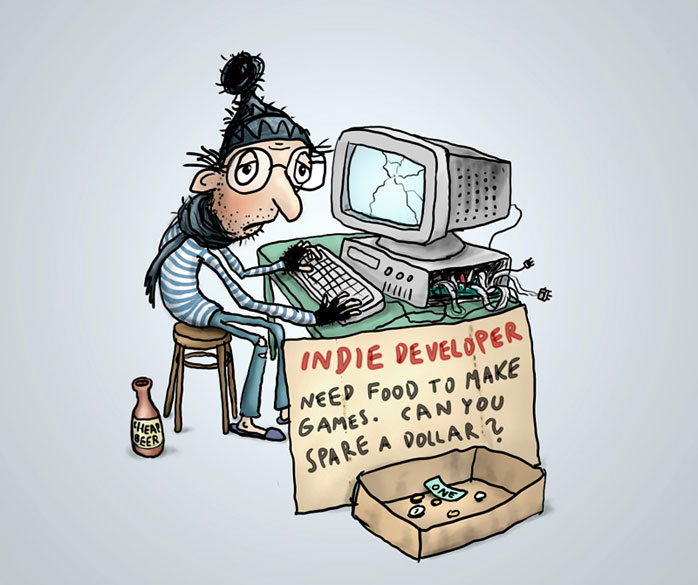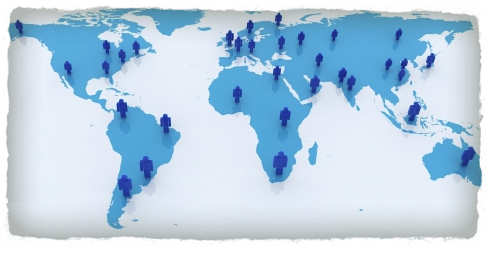AphelioLtd
M joined
This member has provided no bio about themself...

For the last week or so I've been keeping my eye on some indie titles currently in development through websites like IndieDB, Kickstarter, Kotaku, Develop and others in order to see how other people are developing their games. Yesterday evening whilst watching some indie game trailers on YouTube it suddenly hit me how many indie games there are by watching almost a dozen of them by using the ‘related videos' sidebar on the site.
Most of the games looked great, but do all these games help the indie scene? Thinking critically about both sides of the argument, I developed some thoughts on the matter.
Lots of indie developers and indie games is a good thing

- 1. It forces developers to be better, enforcing a ‘dog eat dog', 'survival of the fittest' kind of market
- 2. More games means more ideas and inspiration, which means more good ideas and therefore great games
- 3. More developers means a better community, which means we can help each other more, creating a more vibrant and more lively indie scene
- 4. The growth of the indie scene as a whole will allow a more level playing field with corporate developers, and more recognition in the wider media
- 5. Indie games are a great vehicle for innovation, therefore we will see more new business models, ways to play and ways to interact with each other
Lots of indie developers and indie games is a bad thing

- 1. How many indie developers are giving up their full time jobs to create indie studios? Market reports in the US and Europe show that around 50% of businesses fail in the first 4 years. 50% of the indie community is a lot of casualties, so hopefully there will be new developers to replace them!
- 2. Some great games might never get played because the market is becoming more and more saturated so people never find these great games, or they lose interest in the tired market altogether and stop playing anything at all
- 3. Lots of games means lots of game ideas, which may mean lots of similar, copycat games and game mechanics which passionate gamers looking for something new find less enjoyable
- 4. It's really easy to start an ‘indie studio' these days. All you need is an internet connection, a PC, some skills to develop and some tools, all of which have become readily accessible or cheap in the last few years. Lots of the people who do this could be inexperienced, might not know what they're getting into and could risk their future well being. More importantly though, they could make rubbish games!
- 5. There could be ‘brain drain' away from corporate studios as people leave them to go to Indies, and I've seen this happen much more in recent times than it used to (I'm one of them!). This could mean that innovation levels will fall in the AAA market as the best developers leave to go solo, and the quality of console, PC and similar games will fall, as will their sales
Thinking of these arguments, compounded with a week of taking a look around the indie marketplace, made me truly realise that thousands upon thousands of indie games across an entire range of platforms is a huge amount and is a trend which could affect the industry as a whole, good and bad.
Overall, the vast majority of the effects of this trend are positive, but there could be some downsides. The best thing to come out of it are the great games we've seen and had fun playing, but the bad side is that there could be some pitfalls for us as an industry in the near future when the Indie bubble pops and we start to see some negative effects of our success creep in.
On a final note, I can't even remember a quarter of the trailers, blogs, websites and screenshots that I've seen this past week, and it just goes to show that it used to be OK for you to just get your game out there, but now you have to get it out there and shout about it the loudest.
These are just some of my thoughts on the indie scene at the moment, from the perspective of living and breathing it from the inside out. In answer to this article's question, I'm not sure there could ever be too many indie developers, we simply have too much to offer the games industry as a whole. I hope this provoked some of your own thoughts, please comment with your opinions!
Cheers, you can register to play our games at:
pilots.aphelio.com
We're recently going through a conceptualising/prototyping phase at Aphelio, and we're reassessing our processes of coming up with game ideas. Our previous method was to come up with as many game ideas as possible individually, flesh them out a bit, pitch them to each other and pick the best one, then work collaboratively to add to and improve it.
But we've thrown all that out of the window!
Now we're using a process where we each come up with a bullet point list of ‘essentials' which we think should be in the game. For example it being an online game, it being multiplayer, or it must have monkeys in it. We then cross reference these, and add all of the ones we all agree on into the project's ‘essentials' list. The remaining points which we haven't all agreed on then get discussed and we add them to the list or not.
We've found this a good way of working, as it encourages discussion without it spilling over into a ‘your idea vs my idea' conrontation. Here's an example:
Mike
- Online
- Multiplayer
- HMTL5
- Monkeys

Kraig
- Online
- Multiplayer
- HTML5
- Giraffes

Carla
- Single player
- HTML 5
- Monkeys
- Story driven

The ‘essentials' list
- Online
- HTML5
- Multiplayer
- Zoo game
- Story driven

We then repeat the process for: ‘Who the game is for?' i.e. our target demographic and ‘What features do we want the main mechanics to have?' e.g. replay value, action rather than strategy etc.Deciding on the mechanic comes next, firstly by coming up with mechanic ideas which fit the briefs we have laid out above i.e. does a permadeath mechanic work in an online multiplayer game? Does it suit our target demographic? Etc. Then we pitch these to each other, discuss them and settle on a mechanic.
The mechanic then helps us decide which genre of story and art would best suit the game, i.e. cartoony vector art might not suit a hardcore beat 'em up and a really seriously engrossing epic storyline might not suit a pick up and play mechanic for mobile or tablet devices.
This leads us into which platforms we want to be on, mainly based on the mechanic. We're building in HTML5 anyway, but some games are better with touch screens on tablets, some better with a keyboard and mouse so you still have to decide this.
So far in this example we have the key features of the game, its mechanics, its story genre and art style, now we are ready to drill down into deciding the details of the plot and level design and we can now get prototyping!
I hope that gives a bit more insight into Aphelio's design methods, and also provides some sound advice to teams who are trying to come up with cool game ideas, but are struggling to get cohesion for the vision of the game. I know this relatively simple process (before the complexities of working on a games design document) has allowed us to become more aligned on our objectives for a project and helps eliminates those ‘I want to do an MMO!", "Well I want to do a racing game!" style debates.
I'll post an update with the next stages of our development process soon, feel free to comment with your design processes and offer your opinions on ours!
Thanks again, you can sign up to play our games at
pilots.aphelio.com
Mike
Aphelio
P.S. The idea we're working on is not likely to be a zoo game!

It's 7:37am and after an hour or so of daily routine admin I've decided to write a new blog entry. Why am I up so early I imagine you ask?
Well, it's not part of my normal routine I can assure you (my eyes hurt!). Basically, my girlfriend is off to Germany for a textiles convention (she works as a textiles designer for a fabric company) and her flight is at some time just after 8am. So I started work early as soon as I arrived home around 6:30am and it got me thinking, do indie games companies really work as hard as we can to release games? I mean I know we're a casual industry compared to almost all other professions, but we like to think with that comes a degree of productivity and effort, right?
While I was driving back home from the airport I saw other cars on the street and thought to myself that I was almost certainly the only games designer on those roads at that moment. The time was 6:15am, so I was probably one of the few (maybe only!) games designers awake in my time zone, except maybe someone during a massive crunch. This led to further thoughts of;
"What jobs are these other people doing?"
I live on the outskirts of London, so a lot of my fellow travellers were making their commutes to work. Many of them probably work early shifts, for delivery companies for example. But many of them were bound to have ‘normal' 9-5 jobs and were just making the short in distance yet long in time journey into the UK's biggest metropolis. This brought on another thought;
"Am I working as hard as these people?"
I normally start work at Aphelio around 8-30am or 9am and work through until around 5pm with a short lunch break, often working late when it is required, like most people. I know many games developers do this, but some of them must not, which spawned further thoughts;
"Do my indie developer cohorts work longer hours than me? Do they work weekends? Do the majority of them just sit and play games?"
Basically, I pondered: how disciplined is the average indie games developer and are they working hard enough to achieve success? Especially when compared to the middle-class average Joe working in the city at the lower levels of an investment bank, trying to get a promotion. Are we hungry enough?

I have no way of telling, all I know is that in my personal experience, from games conferences (indie and corporate), developer meet ups, my own experience working at Jagex and my girlfriend and friends' experiences at work, there is certainly a divide amongst most working people and this includes indie developers. There's basically the plodders, who go through life and just do what's required and then there's the grafters, who work as hard as they can or close to it every day, with varying degrees of people in between at various ranges in the spectrum.
In the indie games industry (yes, it's an industry) how does this rule of thumb this manifest itself? Are there designers who make games only for the fun and the thrill, working a few hours here and there but mostly goofing off all day? Are these people complemented by more professional indie developers who design for the fun and the thrill, but also work harder and are more structured?
If I had to hazard a guess, I would say that many of us in the indie games scene are guilty of not working as hard as we can to make our games successful, just like many people don't work as hard as they can in their other professions too. There's always more we can do as indie developers, be it working later hours, going on more client meetings, doing as much market research as possible or exploring as many creative avenues in your game's design as you can.
How about this, do indie developers work as hard as developers who work for bigger corporate studios? Do we work harder? Or less hard?
How many of us do a respectable number of hours when compared to other people within our first world culture who get up at the crack of dawn to grind the metaphorical axe? Most indie developers, as well as most first world people, certainly don't work as hard as those in the third world who are grinding a real axe in order to hunt because they will starve otherwise. This gives rise to even more questions;
"Is it because we are own bosses and as an industry we have a casual culture that we are perceived to work less hard than everyone else? Do we actually work less hard than everyone else? Why are we making games, they don't save lives, or do they?"
Then I stopped thinking because my brain hurt from being up so early.
To conclude, I think as a whole indie developers need to adopt some of the more useful practices from our corporate developer brethren (as well as other professions in some aspects) if we're going to be taken seriously as an industry and make better games.
After all, almost everyone I meet outside the games industry thinks I just sit around and play games all day, or at least jokes about it.

We need to borrow some of these practices because in my opinion, the best indie games are made when a developer embraces the fun and creative side of being and indie, but maximises the potential of that game by working in sophisticated, dedicated and efficient manner in order to execute development properly and get the most out of a game idea.
Don't get me wrong though, I don't want us to get tied up in all the corporate catastrophes that many formerly great developers have had to endure, especially in recent times. After all, our unorthodox processes are often our biggest competitive advantage when fighting against these big corporate games for market share.
So IndieDB community, what are your working habits? Do you work unconventional hours but still get more work done that anyone else? Do you think you work as hard as the nurses, truck drivers, salesmen and retail managers out there?
I hope you enjoyed this article, it was fun writing it, try not to take it too seriously.
So please, join the discussion!
Mike
Aphelio
Well now that's a big question isn't it? It's a long time, 365 days.

One thing I do know, is that in 2013 Aphelio are making a move to become a bigger part of the gaming industry, and this is why we have made some goals for ourselves in the coming year.
Our first goal is to communicate better than ever before: with you guys. This means we are going to be blogging as much as humanly possible, as we want to provide you with as much regular entertaining and interesting content as possible, offering opinions and more importantly asking for yours.
We also want to unleash new ideas on you, even if they are just ideas and don't materialise into anything physical. That is ok for us, its healthy. We want to have glass walls, where you can see how we work from conception to completion and give you an inside look into what it's like to be an indie games studio.
We also want to release more stuff, more regularly, to wider audiences. We're making more of a move to iterative, online, live product development, so you can be a part of our gaming experiences from the moment an idea goes on to paper to when its unleashed upon the world.
Aphelio will become influential in the realm of video games in the coming years, it's not a case of ‘if', it's just a case of ‘when'.
But we are just a small cog (at the moment) in a very, VERY big wheel, which has spun out of control in 2012. And no one, and I mean no one, knows where it's going to end up in 2013. But here are a few guesses.

- Tablets will start to replace portable gaming consoles in market share with a surge of high quality premium games ($20+)
- Smart TVs will become gaming hubs through their app stores
- Console and PC will lose further market share to casual platforms
- Digital download revenue will exceed physical purchase revenue
- The indie scene bubble will ‘pop' as studios don't make solid returns, even on great games
- There will be more studio closures than ever before, with fewer start-ups created than last year
Whilst I wouldn't say these are my predictions, these are things which I wouldn't be surprised about, or I think are likely to happen. Slightly pessimistic, eh? Strange coming from the most optimistic person at Aphelio...
So how's this, I predict that a totally unforeseen prominent new business model (pay per play, arcade style?!) or a new platform or console (Ouya?! Rasperry Pi?!) will change the market in 2013.
And with that, I'll leave you, to ponder how much of this is total bollocks in a year from now...
Leave your comments with your predictions/comments!
Mike
Aphelio
HTML5
This article is going to be about all the things you never hear from a studio (whether indie or otherwise) when they select a technology to develop with or a platform to develop for. In most articles, blogs and social media you always hear about the technical side of things. What is the graphical performance of the platform like and what are the issues with it? How high is the ceiling of the platforms potential technically? What genres of games will work well on the platform and what features can said games have?
I'm going to take a different look at things. I'm going to look critically at HTML5 from a business angle, rather than a technical one, and examine what the advantages and disadvantages of going truly cross platform are.
You can run at low costs

The operative word in that title is ‘can'. If you're clever about it (like us) you can forgo existing engines, tools and plugins and build your own from scratch... if you can work fast, cover the labour cost and do it for cheaper than buying an engine (like us). The best HTML5 engines are not too expensive, but they still need additional technologies to run multiplayer. Picking up an engine, even for free, then having to bolt on all your own tools and get them compatible can run up hidden costs in terms of money and time as well. If you can code in C++, Javascript and HTML5, you should be able to whip up your own engine (relatively) painlessly. Furthermore, once you start releasing your games, you don't have to spend months of time and thousands of pounds/dollars in wages to port your game to other platforms. It will already work on pretty much anything which can connect to the internet so you will have saved yourself some costs there too.
Be everywhere

With HTML5 you can be on everyone's device - at once. Browser, desktop, mobile, it all works and can all be connected instantly for multiplayer. This means that firstly if you don't have a marketing budget and can't dominate a particular platform, you simply launch on all the various platforms available. Even if you can only get 100 downloads on each platform, across the 10 or so HTML5 compatible platforms (the likes of Windows, iOS, Android, Facebook etc), that's 1000 downloads. So roughly speaking, launching a HTML5 game cross platform can get you around ten times more downloads than focusing on a single platform can. This also spreads the risk of releasing your game, as you're not relying on one platform featuring you. Also, you can sit back and see which platforms your product takes off on the most, so if you see that your product is most popular on Android, focus more of your marketing and community management on that platform.
Have something for everyone

The biggest problem games have is finding an audience to play them. Barriers come in the form of genre, i.e. some people only like first person shooters, demographics, i.e. some games are designed for children or adults only, but most importantly platform i.e. not everyone has a PS3, an iphone, a firefox browser etc. The first two barriers mentioned are to do with game design, but the third is to do with your business strategy. Why would you discriminate against some platforms and therefore customers by not making the game available to them? Well the simple answer is certain games only run on certain platforms. Are you going to see Halo 4 running in a browser on a mobile phone? Probably not for a while yet. But you can do something to address that problem now, by making your game available to as many different customers as possible. More players means more variety, which means more types of gamers to design for and more sales to boot.
Be more flexible

What happened to the games industry when the iPhone launched? Not that much for the first few months, but as soon as people realised customers were paying for games on the platform, developers swamped it. The first to jump on it were the small studios followed by the big boys, as the small studios we much more flexible. Now what's happened? The iOS market is flooded, and most of us missed the gold rush. My point? If you pigeon-hole yourself to one platform, you'll find it more difficult to respond to profitable market opportunities on other platforms. You want to be ready when the next iPhone explodes onto the games market, and HTML5 games give you the best chance of doing that. It could be smart TVs, it could be Ouya, it could be anything. Just be ready for it.
Distribute and market your game easier

Once you've built your game in HTML5 you can put it pretty much everywhere. This makes your games route to market a lot easier. Customers have more chance of finding your game easily as it will be on all the major platform's download stores. This means more chance of getting featured than if you target a few stores, and also means that when people refer your game to a friend, they won't go "Oh I don't have an iPhone, I have Android" or "I only play Facebook games". Also, when you do your marketing or promotion, people will try your game much more readily if they see it's an open rather than exclusive product. Not only this but if you invest time or money in marketing, the sales per hour of time spent or sales per pound/dollar spent will be much higher. In this way, HTML5 makes your marketing more efficient too.
The business downsides
As with anything, when something has several really positive upsides, there are bound to be some drawbacks.
The first being you still have to upload your game to every platform. This takes time, is annoying and needs constant revision as platform holders guidelines change very regularly. It also means that you have to do this for every update. Ten times as many platforms means ten times as many updates. Even if you don't have to change the code much, you still have to go through the formal process for that platform every time.
It also takes longer to build a cross-platform HTML5 engine, than one for just a single platform, for obvious reasons. Getting the technology to play nice with pretty much every store, every browser, every phone, tablet and desktop can become a minor nightmare.
Monetisation can also be difficult. Android monetises differently to iOS, Facebook has its own currency, and who knows what Windows Store users want yet - pay up front for bigger games perhaps? Considering all this in your game's design can prove to be a bit of a headache.
Some people might also consider HTML5 games to be simply less appealing on mobile, desktop and browser than graphics focused app games like Infinity Blade or browser games which need the Unity plugin such as Battlestar Gallactica. This problem leans more on the technical side, and includes HTML5's notorious sound issues, but really this is affects the business strategy too. If your product is on the same platform as technically superior products, this is going to affect the pricing and promotion strategy of your game.
To Summarise
Well, that's about it for Aphelio's insight into the business aspects of HTML5, a topic which needs to receive more attention if you ask us. As we've said before, we want to be amongst the forerunners of the HTML5 community, and this blog is just the first step towards reaching that goal. Please post, comment and join the discussion and feel free to ask any questions about HTML5 or Aphelio that you wish.
Thanks for reading; you can test the latest Aphelio games, apps and technology by signing up to our Test Pilots Initiative here:
pilots.aphelio.com
Thanks,
Mike
@AphelioLtd

Aphelio are proud to announce the launch of our ‘Test Pilot Initiative’, inviting you to try out our latest cross platform HTML5 games for free.
It was last week that I realised the sheer scope of people we were trying to reach with our products, and the sheer scale of platforms that we had to get them working on.
Testing in the games industry gets either played up or played down, depending on who you’re talking to. Oddly, many regard it as a low-tier job – entry level, unskilled. I don’t think this is the case. Your testing department is one of the only barriers between you and developing a crummy or failing game. They need tools to get the job done, the same way programmers need compilers. A games company that hires underpaid testers with the notion that all they’ll do is “play” your game is one that doesn’t understand how big a difference their feedback can make.
As a three person company, it’s impossible for us to have our own testing department.
Testing, in some shape or form, is done by everyone on the team – even if it’s just checking if something looks alright. Feedback is pivotal. In the games industry, ignorance is not bliss…
Thinking back on my experiences as a playtester, the whole gig was rather underwhelming. You go in, sit down with someone watching you, and play a usually quite ugly or buggy build of a game you’re not allowed to know the name of. You sign away your rights to discuss your experience in an NDA contract, something I always felt was quite harsh given the lack of gravity held in the situation. And finally, 90% of the time, so-called “external” or voluntary playtesters never hear or get anything back from their session. Instead, they spent a couple of hours of their time to do something they aren’t allowed to talk about. All the hype behind seeing “inside” a game studio is lost.
It’s not always like that I’m sure. But we can admit, as an industry, that we perhaps manipulate our audiences a little bit too much when it comes to “getting close” to the industry. Just ask the thousands of games students out there, who have gone all in chasing a dream that many won’t achieve.
My biggest concern however was the existence of the “open beta.”
The term is widely abused I think. Suddenly everyone can now falsely say they were a “tester” of a game. The hardcore of the fanboys will even stretch as far to say they “worked with” said studio. Open betas are primarily marketing driven. They’re good for stress and quantitative testing. But when a company like does an Xbox 360 beta of their game two weeks before launch – even after the final game disc has gone gold – you can’t help but look at some of these events with some sceptisism.
The Test Pilots Initiative will be different from that. It will go beyond the short and fruitless tester lifecycle by becoming integrated into the development process, not bolted onto a marketing campaign.
It’s exciting because we can do what we want with it. Building a community experience over something that’s simply one-way. Something that’s honest. Something that’s quality.
We’re still building this thing from the ground up. I haven’t even had time to craft a logo for it. That will come. A portal page as well I think. And it all has to be slick. From the initial sign-up to the point of reporting feedback from a test app. It has to be as slick as possible. That’s the Aphelio way…
Applications for the Test Pilot Initiative will only be open for a limited time. Once we feel we have enough initial members, we’ll close applications for a later date.
pilots.aphelio.com
Kraig Walker
CTO
Aphelio
“NEW STUDIO ALERT!” – Develop Magazine 133


The world famous Dare To Be Digital games development competition in Dundee this year hosted the new Dare+ program for young entrepreneurs interested in forming their own studios, and out of the strain and sleepless nights, a studio is born.
Michael Walker, Kraig Walker and Carla Johnston, all met on the first day of the Dare+ course back in July. After completing the course and demoing their products at Dare Protoplay Festival, the trio decided to form a new company, Aphelio.
Team Aphelio has been working together for less than six months, but they are already working for clients on commercial contracts. Aphelio will focus on making social and casual games for HTML5 as well as platforms which are "under served".
The studio is currently being funded by the trio themselves, but they're in the process of seeking investment.

"Dare To Be Digital is a fantastic event, and the Dare+ course seemed ideal for me as I wanted to start my own games studio." Former Jagex Community Coordinator Michael Walker explains. "Now I'm bringing ideas to life at Aphelio, with two fantastic business partners I would never have met without being on the course in Dundee."
Dare+ allows individuals to take part in a fast paced business course where they work as teams to create a presentable prototype in less than four weeks. "We're already well underway with Aphelio, working on the contracts which we have been able to secure, as well as developing our own titles using the latest web technologies."
Kraig Walker, co-founder of the company talks about the company's almost eccentric adoption of the new. After being chairman of the IGDA Scotland Chapter at 18 and acting as an outspoken new member of the Scottish Games Industry, he's eager to carve out a new style of games company: "Aphelio is all about testing the limits of what people perceive to be possible in gaming. We think people will find what we have in the pipeline to be very interesting, and most importantly - original.
"By living on the bleeding edge both technologically and in our design approach, our work will definitely belong on the platforms we push them on, and hopefully inspire a new approach to game development."
Aphelio.com

Well first off, that’s a difficult question to answer. As a studio, we have many faces, and we’re doing many things at once. But I’ll give it a shot.
On any given day, at heart we are a passionate indie games studio working on developing games which if we were the customer, they would be our favourite games. That’s who we are. But also on any given day, we are a super-efficient, gun-for-hire digital agency who can make you anything you want: the coolest websites, the most stand out graphics and media as well as ahead of the curve apps and games. It’s hard to be both, but we’re managing it as we learn and grow.
We truly are both of these things. But who Aphelio really are, is a band of three individuals who have started this journey together with a common mission. And rather than talk about each of us individually, I’m going to explain what we are collectively bringing to the games industry and wider businesses industries as a whole.
Aphelio represent a fresh take on things. The games industry is all over the place at the moment, and rather than analyse what’s going wrong or right with the industry and look outwards, I’m going to look inwards at what we can do to change it. Starting with our philosophy.
Basically, we’ll do anything just to be different. Different is better. Different is what makes the world a fun place. Being different is part of our mission.
What we aim to do is simply offer an alternative to what’s already out there. We don’t bash it, we don’t criticise it, and we don’t knock it. All we want to do is give you guys something different. That is our mission, and what we as a company bring to the table.
So how are we doing on this mission?
Well, to be honest, we haven’t even reached the starting grid yet. We have been developing our core technologies over the last few months and are at the point where were almost ready to test our game engine with a simple but fun game.
Our first mission (regarding our own products) is to launch this game, test our HTML5 engine, and get our cross platform multiplayer working. We have chosen a relatively simple yet fun game to launch first, as we want to keep problems on the games design side of things as smooth as possible, while we tackle the mammoth, daunting, and highly ambitious task of integrating cross platform multiplayer.
Think of our first release as a test run for the engine to check everything is in place. Once we have that game up and running in multiplayer, then we will be at the starting grid ready to put the pedal to the metal once the lights go green and start churning out games like there’s no tomorrow. This first game is just the beginning.
But all this highly creative vision actually exists in the real world, and whilst we have time to develop this amazing technology, like all game developers we need to eat, and eat we shall. This is because we have made the conscious decision to undertake some exciting contract work to develop some inspirational apps and websites whilst also working on our own products and game engine, hence our status as a ‘gun-for-hire’. This focus therefore completes our strategy as a business, and is a piece of advice I would recommend to any games studio or any business for that matter in order to survive.
Working with clients in this way has been great for us. We’ve met some interesting people, designed for customers other than our own and we’ve also gotten to see the world outside of our indie studio ‘bubble’. And we’ve had some fun and learnt a few things along the way.
We’ll keep you updated on our various pieces of work-for-hire in the future, as all of them are interesting in their own way, either through their design or because they are for a good cause (we hope to announce these ones soon!). We can also use the technology we develop on these projects to help build our own games engine technology, and similarly we can use the technology we develop for our own games on future projects, so it’s really a win-win for Aphelio and you as the players and customers.
To summarise, those two focuses are essentially who we are and what we are doing at the moment. This is how a real indie games company works, this is real life. I hope you have enjoyed reading this insight, and I hope other indie developers like to see that they’re not alone. If they and you the community can learn from our experience over the coming blogs, then we will be very happy.
On that note, we’re going to be blogging very regularly as we think it is imperative to uphold our transparent culture as a studio, and we hope to interest you and entertain you as much as we can (comedy relief blogs to follow).
That’s all for now, thanks for reading I hope you are beginning to understand us more as you begin this epic journey with us. One day you can be one of those people who claim “I was there for the first blog post!”
Which reminds me, sign up to our Test Pilots Initiative on our website to test our games for us in the future and then your claim will be legit.
See you in the stratosphere,
Mike
P.S. Has anyone figured out where the name Aphelio comes from?

